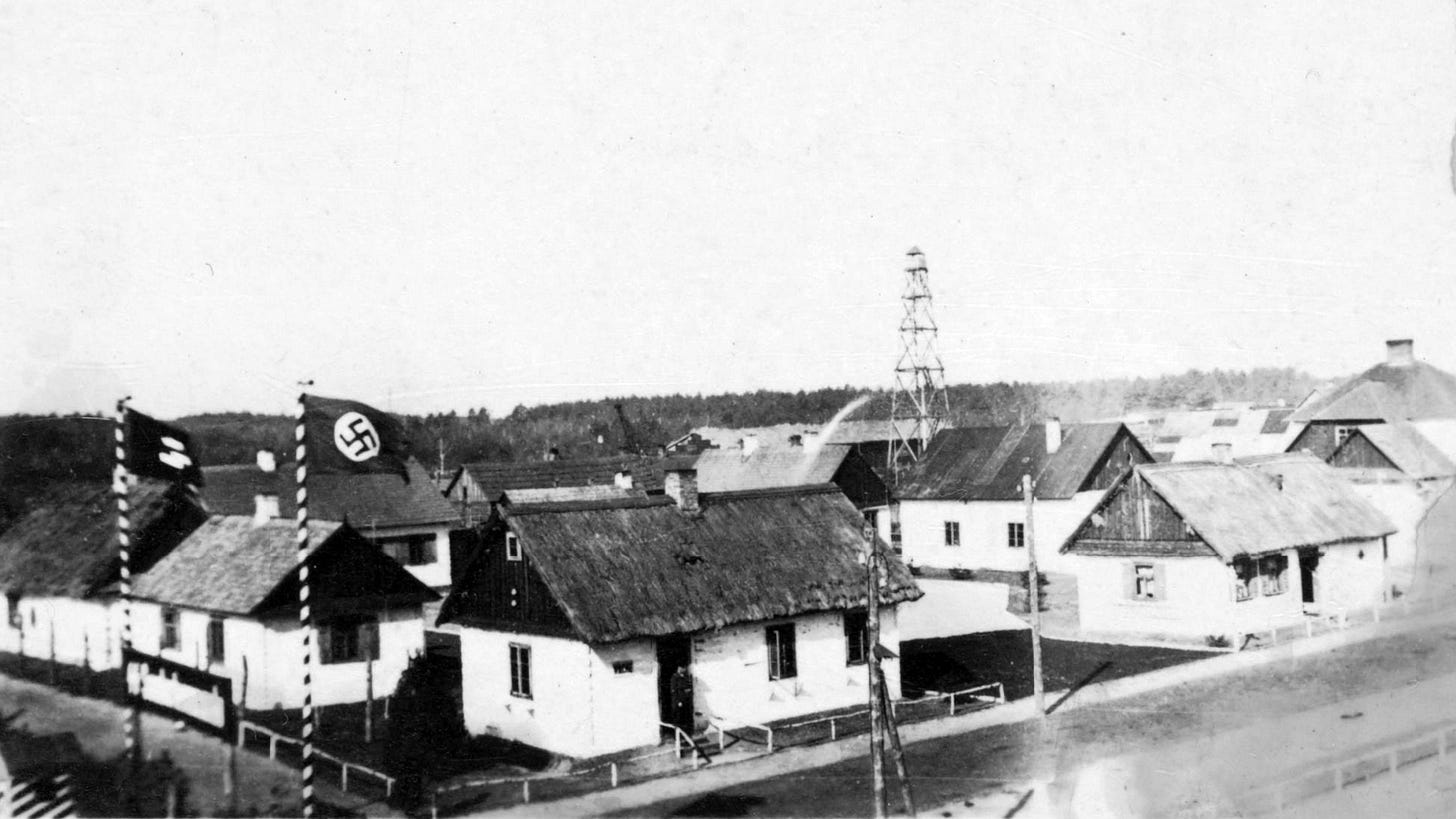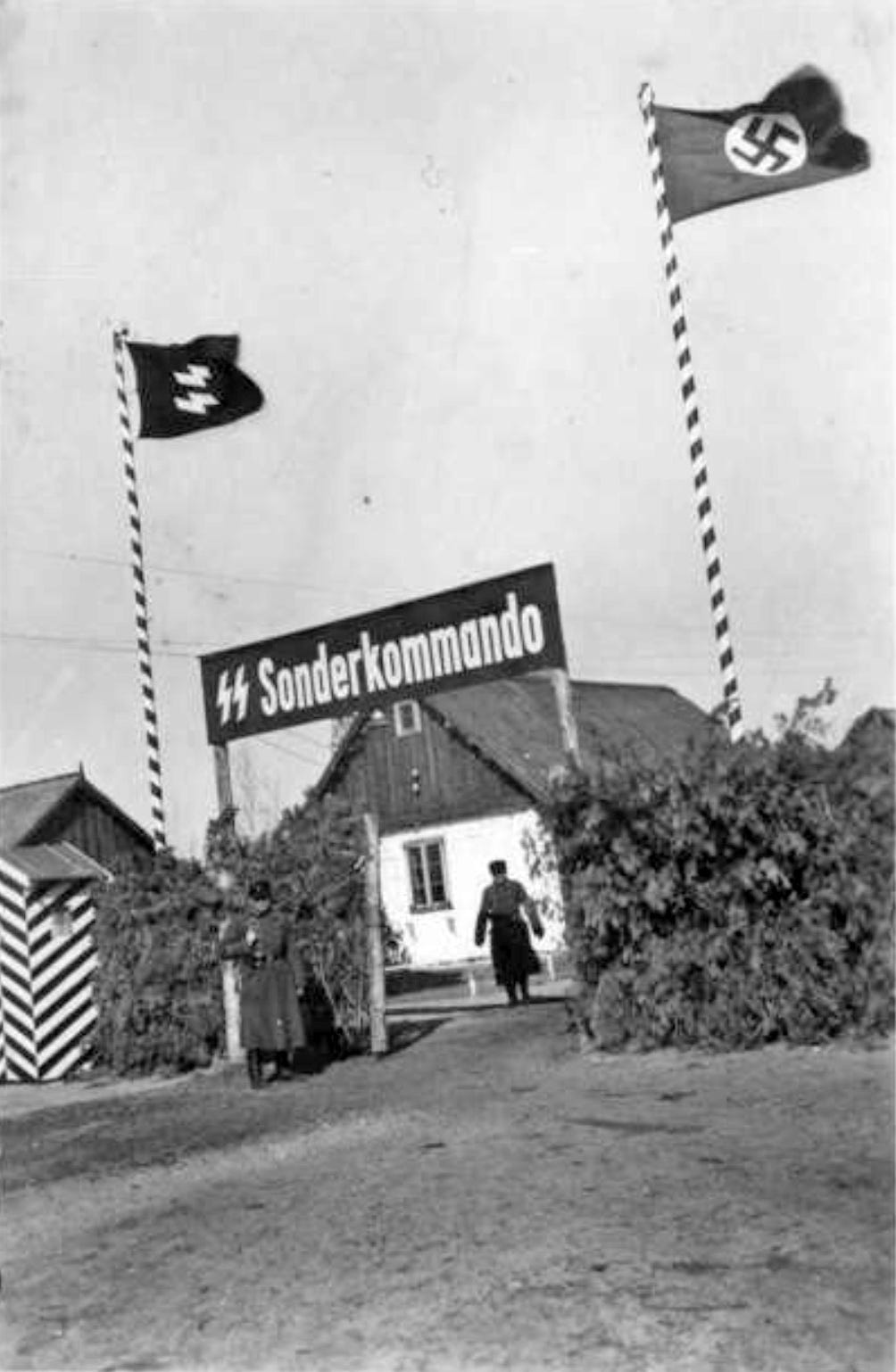Arrival at Sobibor
4th June 1943: Dutch Jews, transported across Europe, still believe that they are needed for some special German project in the East

Jules Schelvis, a Dutch Jew, had been put in a cattle wagon, along with the rest of his family, on the 1st June 1943. It was the fourteenth such transport that had left the Dutch transit camp of Westerbork. They had been told they were destined for 'work in the east'.
It was obvious we had arrived at our final destination: a place to work, as they had told us in Holland. A place where the many who had gone before us should now also be working. Our presence must be of quite some importance, why else would the Germans have bothered to bring us all the way here, travelling for three days and nights, covering a distance of two thousand kilometres?
Jules Schelvis1 describes the well-practised routine at Sobibor for handling the thousands of men, women and children arriving from around Europe. A mixture of threats and deception, combined with the simple strategy of hurrying everyone along, made it easy to handle the compliant crowd. They would have been utterly terrified had they known what was about to happen:
In the morning of Friday 4 June we finally stopped at Chelm, close to what had once been the Russian border.
The journey had made us so weary that we were no longer interested in where we would end up. Only one question remained how to get out of this foul–smelling overloaded cattle wagon, and get some fresh air into our lungs. That Friday morning at around ten, after a seventy-two hour journey, we finally stopped in the vicinity of a camp. It turned out to be Sobibor.
The Jews of the Banhofskommando were very heavy-handed getting us off the train onto the platform. They let on they were Jewish by speaking Yiddish, the language of the Eastern European Jews.
The SS men standing behind them were shouting “schneller, schneller,” faster –faster, and lashed out at people once they were lined up on the platform. Yet the first impression of the camp itself aroused no suspicion, because the barracks looked rather like little Tyrolean cottages, with their curtains and geraniums on the window sills.
But this was no time to dawdle. We made our way outside as quickly as possible. Rachel and I, and the rest of our family, fortunately had no difficulty in swiftly making our way onto the platform, which had been built up of sand and earth.
Behind us we could hear the agonised cries of those who could not get up quickly enough, as their legs had stiffened as a result of sitting in an awkward position for too long, severely affecting their circulation. But no one cared. One of the first things that occurred to me was how lucky we were to all be together, and that the secret of our destination would now finally be revealed. The events so far did not hold out much promise though, and we understood that this was only the beginning.
It was obvious we had arrived at our final destination: a place to work, as they had told us in Holland. A place where the many who had gone before us should now also be working. Our presence must be of quite some importance, why else would the Germans have bothered to bring us all the way here, travelling for three days and nights, covering a distance of two thousand kilometres?
Yet the Germans were using whips, lashing out at us and driving us on from behind. My father-in-law, walking beside me, was struck for no reason. He shrank back in pain only for a moment, not wanting anyone to see. Rachel and I firmly gripped each other’s hand, desperate not to get separated in this hellish situation. We were driven along a path lined with barbed wire towards some large barracks and dared not look round to see what was happening behind us.

We wondered what had happened to the baby in our wagon, and to the people unable to walk; and what about the sick and the handicapped? But we were given no time to dwell on these things, and, besides, we were too preoccupied with ourselves. “What shall I do with my gold watch?” Rachel said. “They will take it from me in a minute.” I replied, “Bury it, because it could be worth a lot of money later.”
As she was walking, she noticed a little hole in the sand, and quickly threw the watch down, using her foot to cover it up. “Remember,” she said, “where I’ve buried it. We can try digging it up later, when we have a little more time.”
That Friday, 4 June 1943, the Sobibor sun beat down on our heads. It was midday and very hot already. There we were, defenceless, powerless, exhausted, at the mercy of the Germans, and completely isolated from the rest of the world. No one could help us out here. The SS held us captive and were free to do as they pleased.
Like cattle, we were herded through a shed that had doors on either side, both wide and open. We were ordered to throw down all our luggage and keep moving. Our bread and backpacks, with our name, date of birth and the word ‘Holland’ written on them, ended up on top of the huge piles, as did my guitar, which I had naively brought and carefully guarded all the way. Quickly glancing around, I saw how it ended up underneath more luggage. It dawned on me that there was worse to come. Robbed of everything we had once spent so much care and time in acquiring, we left the shed through the door opposite.
I was so taken aback and distracted by having had all our possessions taken from us, that although I had seen an SS man at some point, I never noticed, until it was too late, that the women had been sent in a different direction. Suddenly Rachel was no longer walking beside me. It happened so quickly that I had not even be able to kiss her or call out to her. Trying to look around to see if I could spot her somewhere, an SS man snapped at me to look straight ahead and to keep my “Maul (gob) shut.”
Along with the men around me, I was driven on at a slightly slower pace to a point just an opening in a fence, where yet another SS man was posted. He looked the younger men up and down fleetingly, seeming to have no interest in the older ones. With a quick nudge of his whip, he motioned some of them to line up separately by the edge of the field.
Directly in front of me, my brother-in-law Ab, was directed to join this growing group. My father-in-law, David and Herman, my thirteen year old brother-in –law, were completely ignored. My father-in-law was too old, Herman too young. Glancing at me for just a moment, he let me pass as well. He needed to select only eighty healthy looking men.
Those who had not been selected had to move along into the field and sit down. That Friday, 4 June 1943, the Sobibor sun beat down on our heads. It was midday and very hot already. There we were, defenceless, powerless, exhausted, at the mercy of the Germans, and completely isolated from the rest of the world. No one could help us out here. The SS held us captive and were free to do as they pleased.
It would be time before Schelvis realised that they had not arrived at a work ‘camp’ but a killing centre dedicated to murder on an industrial scale. Even the “eighty healthy-looking men” were a disposable asset, destined to work on the unspeakable horrors of disposing of the bodies before being murdered themselves. It was a miracle that Schelvis survived to tell his tale.

Almost all 34,313 Jews who were sent to Sobibor from Holland (around a third of the total deportations from Holland) were gassed shortly after arriving at the 'camp'. A few hundred men and women were selected for forced labour, either in the 'camp' or at nearby locations. Of this group, only eighteen would survive the war.

Read the complete account at the Holocaust Research Project.
Sobibor Interviews has much more on the Dutch transports to Sobibor.
The above images come from the Sobibor perpetrator collection, Johann Niemann’s personal photographic album, now held by the USHMM.


